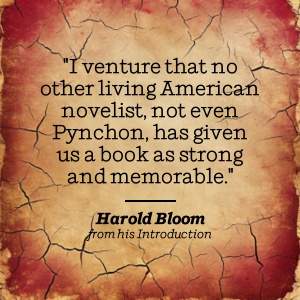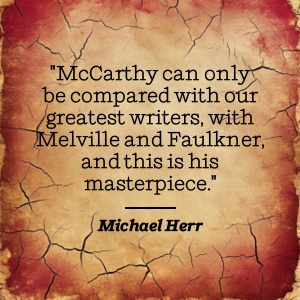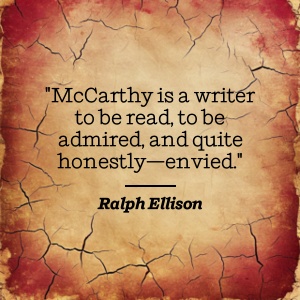معلومات عنا
حقوق الطبع والنشر © 2024 Desertcart Holdings Limited
Desert Online General Trading LLC
Dubai, United Arab Emirates



Full description not available



C**S
Comparisons to Faulkner and Melville valid, but a laborious read
Let’s start with the most common complaint about this book. Yes, almost all the characters are violent, but that word doesn’t convey the sheer cruelty inflicted in this story. Certainly all the main characters are violent including the protaganist, “the kid”. The few minor characters who are not are generally brutalized. I quit reading for a few month less than halfway through. When I picked it back up I finished the last two hundred pages in a long day. I guess I was better prepared for the violence and the lack of morality in all the characters, but I also felt I was becoming densensitized during my second attempt. If you read the backcover or a critical summary you should be aware violence is at the core of Blood Meridian, it shouldn’t be a suprise. But the depth of it might.Now this is the type of read that for the average reader, like myself, can be laborious. I do not have the skill to be a book critic and struggled as an English major to understand the intracacies of some masterful writers, compared to my professors and some fellow students who quickly identified subtext and points of style. McCarthy is one of those writers, certainly Blood Meridian is one of those works. This novel is often compared to Moby Dick or Faulkner’s top writing, and the comparison is spot on for me. I struggled to understand the subtext of what is being said, re-reading McCarthy’s frequent long descriptive sentences which are amazing to behold. They can be longer than a typical paragraph but are smooth and flow perfectly. I could never pull that off, it would either be a disjointed run-on sentence or it would take me ten maybe twenty sentences to convey what McCarthy does in one. What is amazing is these are common throughout the book, every page is filled with them. I can only imagine how much work went into each page, this is clearly the result of many years of focused effort.Similarly, I hear complaints from others or see complaints in reveiws regarding McCarthy not using quotation marks to highlight dialogue. This is a hallmark of his work, and he is not the first nor last to choose such a style. I think too much is made of this by people who really just didn’t want to put in the effort to read the book. Which is fine, this is not a traditional Western in any way, its not a tradtional mindless entertaining story. That’s one reason I am just reading this at age fifty and I am a fan of McCarthy. I have had the book for ten years and just read it. I knew going in it was the type of book you need to prepare for. But I don’t believe most people who claimed they couldn’t tell when a character was speaking are being honest. More likely they are just annoyed as it takes more effort to follow who is speaking, to re-read to understand, and if you want to skip the long descriptive sections to jump to the next scene of dialogue it is hard to do without quotation marks. This is just not an issue. Is it a gimick by McCarthy and those who pull it off? Maybe, I don’t know what they have said about the style but I suspect its more about flow and keeping the text clean. The pages do look beautiful and that affects your mood when reading. Also, quotation marks and other punctuation does in fact effect the cadence of you reading. Regardless of all that, I don’t believe it will effect most readers and is a weak complaint.As I mentioned, there are many long descriptive sentences. Sometimes there are pages of this with minimal action occuring, but you tend not to notice unless you are really analyzing the style. Very vivid, I could visualize almost every scene, and appreciated McCarthy’s ability to be so descritpive while simultaneously leaving specifics of how we visualize up to us individually. I suspect how I see each character is different than everyone else, but we all enjoy vivid scenes. For this reason I hope they don’t make a film version of this. For one, I think it would be a failure, especially in today’s hypersensitive PC climate, and two, I just think it would be impossible and an antithesis to what McCarthy’s writing accomplished.I did struggle with the last twenty pages, because, as I’ve said this is not a book where the story is solely at the heart of things. Symbolism and style are equally as important. And the judge as a character is the most complex. The final encounter and how things were left was at first baffling to me, but after re-reading the last few pages I loved it. Won’t ruin things but there is of course room for interpretation. Sometimes I hate that, sometimes it works. For me at least, this time it worked. The epilogue was however completely unnecesary and a distraction. I get what its saying but its like hitting me over the head. I almost feel like ripping that page out it seems so out of place, like a teacher told him, now put this in so it will all be tied together and the stupid people will “get it”. I might be one of those stupid people and I just found it annoying.Overall, I enjoyed the novel once I came to accept the inclusion of so much violence, and am glad I set aside mental space to read it and time to chew on what it was saying. If you want to read a real western, stick with Zane Grey, Elmore Leonard, even Louis L’Amour if you want the heart of the genre. If you want a taste of the true history of the west in the mid 19th century, framed with an exploration on man’s capacity for violence and cruelty, pick up a copy of Blood Meridian. Just allow more time for the read and you’ll likely get more out of it.
D**9
A challenging and worthwhile read
Rarely, okay, never have I read a book which is so simultaneously abhorrent and appealing. Blood Meridian is a book that treats violence as a commonplace occurrence, and offers little respite in its continual assault on all (or anything, please anything) that is good in the world. The prose is stark, direct, and often undefinable (perhaps somewhere, but I often found words for which no definition can be found). The novel immerses you in a world of evil and violence far more terrifying than any post-apocalyptic book can create. And this, indeed, is how I came to this “masterwork” by Cormac McCarthy (bio). I’ve read a few of his novels, and consider “The Road” (blogged about here) one of my all time favorite novels.This novel centers around “the kid” in the 1850s as he travels from his home state of Tennessee and joins up with the Glanton Gang, a real-life group of killers (there are probably more appropriate terms, but I’m calling them what they are) led by John Joel Glanton. Hired by the Mexican government to fight off attacking Native Americans, they killed any Native American they could since they were paid by the scalp. Women, children, unarmed men — it makes no difference. Even non-Native Americans were not exempt for their depravity as all of humanity appears to be at their disposal. What makes McCarthy’s descriptions so unnerving is the calmness and detachment used in describing the killings. You can almost read through some of them before the horror of what is happening dawns on you. I’m reminded of Tim O’Brien’s writing about the My Lai massacre during the American war in Vietnam. In the Lake of the Woods is a novel about a politician later found to have been involved in the massacre. But the most disturbing part of the book is not the fiction, but a chapter of excerpts from the actual court-martial records. What you see is this same dispassionate account of brutal abuse and killing. As if the event itself is not horrific enough, the presenting of it as a normal occurrence makes it even worse.McCarthy’s prose is powerful. It can edge on the dramatic, and at times tips into the over-dramatic category, but its power is clear."Under a gibbous moon horse and rider spanceled to their shadows on the snowblue ground and in each flare of lightning as the storm advanced those selfsame forms rearing with a terrible redundancy behind them like some third aspect of their presence hammered out black and wild upon the naked grounds. They rode on."The phrase, “they rode on,” is the perfect balance to that long, intricate preceding sentence. Language like his can be hard to follow in our quick read society, but a slow and thoughtful read pays off. Plus, he reminds you of the beauty of words (and perhaps I just tipped into the over-dramatic category).While “the kid” is the anti-hero of this anti-western, it is the Judge who stands out as the most memorable character. A large, hairless, white man, he is often naked and always calm. He appears to be waiting for others as they come to him, and his intellect puts him ahead of both enemies and his fellow travelers. He makes observations in his notebook in order to understand and thus control the world, and is given to long, fascinating discourses on a variety of topics. He is both God-like and devil-like, omniscient and monstrous, and terrifying in his outreach.Toward the end of the book “the kid” faces off with judge, the culmination of a relationship in which they dance around one another throughout the book."The judge smiled. He spoke softly into the dim mud cubicle. You came forward, he said, to take part in a work. But you were a witness against yourself. You sat in judgement on your own deeds. You put your own allowances before the judgments of history and you broke with the body of which you were pledge a part and poisoned it in all its enterprise. Hear me, man. I spoke in the desert for you and you only and you turned a deaf ear to me. If war is not holy man is nothing but antic clay."It is as if “the kid” recognizes his role in evil, and by the recognition (for there is no repentance) he has broken the fabric of their community. He recognizes the judge as the one behind the evil, but he cannot separate himself. As the judge says, “What joins men together is not the sharing of bread but sharing of enemies.”Clearly, this is a disturbing novel. The fact that McCarthy bases this on historical occurrences does not allow us to write this off as some post-apocalyptic fantasy. Instead, we have to face the judge and his comments about our own culpability in human affairs."You can find meanness in the least of creatures, but when God made man the devil was at his elbow".
ترست بايلوت
منذ أسبوعين
منذ أسبوعين